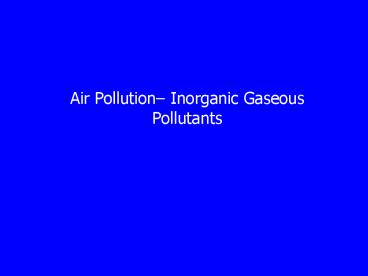Air Pollution - PowerPoint PPT Presentation
1 / 25
Title:
Air Pollution
Description:
Air Pollution Inorganic Gaseous Pollutants Major inorganic gaseous pollutants Carbon monoxide (CO) Sulfur dioxide (SO2) Nitrogen Oxide (NO, NO2) NOx=NO+NO2 Ozone ... – PowerPoint PPT presentation
Number of Views:383
Avg rating:3.0/5.0
Title: Air Pollution
1
- Air Pollution Inorganic Gaseous Pollutants
2
Major inorganic gaseous pollutants
- Carbon monoxide (CO)
- Sulfur dioxide (SO2)
- Nitrogen Oxide (NO, NO2) NOxNONO2
- Ozone (O3)
3
HK 1-hour Air Quality Objectives for various air
pollutants
Air Pollutants AQ Objectives (mg/m3) AQ Objectives (ppm) US AQ Standards (ppm)
Carbon monoxide 30000 26.2 35
Sulfur dioxide 26.2 0.306 0.50a
Nitrogen dioxide 35 0.159 0.05 b
Ozone 800 0.122 0.12
a 3-hr standard, b annual arithmetic mean
4
Carbon monoxide Health effect
- CO enters the blood stream and binds
preferentially to hemoglobin, thereby replacing
oxygen.
320 times stronger than hemoglobin-O2 binding
5
Carbon monoxide sources and sinks
Such as automobiles
- Sources
- Incomplete combustion (internal engine)
- Biomass burning
- Methane oxidation
- Oxidation of non-methane hydrocarbon
- Decay of plant matter
- Sink
- Reaction with OH radical
- .OH CO ? CO2 H.
- H. O2 M ? HO2. M
- Removal by soil microorganism
6
CO formation from methane oxidation
7
CO emission sources in Hong Kong
8
Carbon monoxide Atmospheric chemistry
- CO OH O2 ? CO2 HO2.
- HO2. NO ? NO2 OH
- NO2 hv ? NO O
- O O2 M ? O3 M
- Net CO 2 O2 hv ? CO2 O3
The net reaction can be viewed as a catalytic
oxidation of CO to CO2. Net formation of O3
occurs.
9
Carbon monoxide control strategies on the
automobile source
- Employ a leaner air/fuel mixture (higher air/fuel
ratio) - Employ catalytic exhaust reactors
- Excess air is pumped into the exhaust pipe.
- Air-exhaust mixture pass through a catalytic
converter to oxidize CO to CO2. - Addition of oxygenates to gasoline
- Examples of oxygenates methanol, ethanol, MTBE
10
Sulfur dioxide Health effect
- Produce irritation and increasing resistance in
the respiratory tract. - Mucus secretion
- In sensitive individuals, the lung function
changes may be accompanied by perceptible
symptoms such as wheezing, shortness of breath,
and coughing. - may also lead to increased mortality, especially
if elevated levels of suspended particles are
also present.
11
Sulfur dioxide Sources and sinks
- Sources
- Combustion of S-containing fuel in electric power
plants, vehicles. - S (organic S FeS2 pyrite) O2 --gt SO2
- Oxidation of H2S 2H2S 3 O2 --gt 2 SO2 2 H2O
- H2S is produced as an end product of the
anaerobic decomposition of S-containing compounds
by micro organisms. - Oxidation of DMS
- Sink
- Converted into sulphuric acid in either gas or
liquid phase
12
SO2 emission sources in Hong Kong
13
Formation of sulfuric acid and sulfate from SO2
- In gas-phase
- SO2 .OH M ? HOSO2. M
- HOSO2. O2 ? HO2. SO3
- SO3 H2O M ? H2SO4 M
- In aqueous phase, dissolved SO2 is oxidized to
sulfate by - O3 (dominant pathway when pHgt5)
- H2O2 (dominant pathway when pHlt5)
- organic peroxides
- O2 catalyzed by iron and manganese
- Sulfate formation
- 2 NH3 H2SO4 ? (NH4)2SO4
14
Sulfur dioxide Control strategies
- Removal of S before DURING burning.
- Fludized bed combustion Coal is burned with
limestone (CaCO3) (finely pulverized) or dolomite
(Ca-Mg carbonate) or both. - CaCO3 --gt CaO CO2,
- CaO SO2 --gt CaSO3.
- CaSO3 is removed from the stack by an
electrostatic precipitator. - removal of S from smokestacks before entering the
atmosphere. - Flue-gas desulfurization SO2 is washed from the
chimney (flue) gases by absorption in an alkaline
solution.
15
Sulfur dioxide Control strategies (Continued)
- 3. Dilution
- Installation of tall stacks reduces SO2 levels
in the immediate neighborhood by dispersing them
more widely
16
Nitrogen oxides Health Effects
- NO
- Cellular inflammation at very high
concentrations. - May be incorporated into hemoglobin in the blood
to interfere with the transport of oxygen around
the body. - NO2
- irritate the lungs
- lower resistance to respiratory infection such as
influenza.
17
Nitrogen oxides Sources and sinks
- Sources
- Fuel combustion in power plants and automobiles.
- N2 O2 --gt NO
- 2 NO O2 --gt 2 NO2
- Natural sources electrical storms bacterial
decomposition of nitrogen-containing organic
matter
18
NOx emission sources in Hong Kong
19
Nitrogen oxides Atmospheric chemistry
- Interconversion of NO and NO2
NO2 hv ? NO O (1) O O2 M ? O3
M (2) NO O3 ? NO2 O2 (3)
No net O3 formation
NO2 hv ? NO O (1) O O2 M ? O3
M (2) HO2. NO? NO2 OH (4) RO2. NO ? NO2
RO. (5)
O3 is formed
20
Nitrogen oxides Atmospheric chemistry
- Formation of nitric acid
Gas-phase reaction NO2 OH ? HNO3 daytime
(dominate pathway)
Heterogeneous reaction NO2 O3 ? NO3 O2 NO3
NO2 Û N2O5 N2O5 H2O (aq)? 2 HNO3 (aq)
Minor pathway Only operative during nighttime
21
Nitrogen oxides Atmospheric chemistry
- Formation of nitrate
HNO3 NH3 ? NH4NO3 HNO3 NaCl(s) ? NaNO3 HCl
22
Nitrogen oxides Control strategies
- 1. Lower the combustion temperature of the
furnace in electric power plants - 2. Install catalytic converters catalytic
converters in automobiles can remove 76 of NOx
from tailpipes.
23
Two-stage combustion to reduce both NOx and VOCs
- First stage combustion conditionrich in fuel
- Second stage combustion conditionrich in air
24
Three-way catalytic converter for automobile
exhaust (Remove CO, NO and HC)
HC H2O H2 CO 2NO 2H2 N2 2 H2O
2CO O2 2CO2 HC 2O2 CO2 2H2O
Catalyst Rhodium
Catalyst Rhodium
Catalyst Platium/palladium
25
NOx control in power plants
- Ammonium reduction of NO
- 4NH3 6NO 5 N2 6 H2O
- Urea reduction of NO
- 2CO(NH2)2 6NO 5 N2 2 CO2 4 H2O































